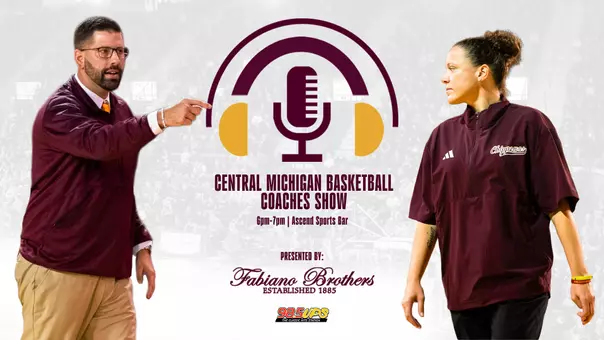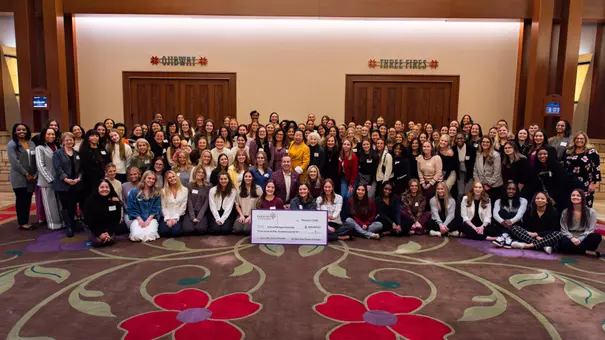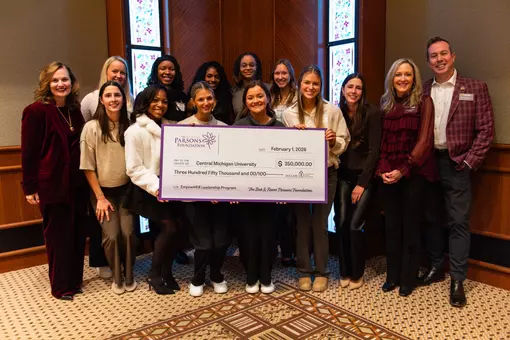Central Michigan University Athletics
New Face in the Game
4/13/2006 12:00:00 AM | General
April 13, 2006
Reprinted from the Spring 2006 issue of Centralight.
Dave Heeke has grabbed the reins as CMU athletics director after Herb Deromedi's retirement in January. Heeke spent the past 18 years at the University of Oregon, most recently serving as senior associate athletics director and chief of staff. An East Lansing native, he graduated from Albion College, where he played baseball, and he later earned a master's degree from Ohio State. Don Helinski, '96, CMU sports information director, chatted with Heeke about his plans for CMU and his days as an Oregon Duck.
What attracted you to this position and CMU?
The tradition of CMU athletics and the ability to combine my professional goals with personal family goals of getting back home to Michigan. That's so rare in our business because we tend to bounce around, but to bring it all together at CMU was perfect. There's a terrific foundation here. Herb Deromedi did some great things, and there's a true solid rock foundation, which is unlike many programs of our peers. It's about vaulting from here. CMU has a storied athletic tradition, and I'm looking forward to being part of the group that writes the next chapter.
How would you describe your philosophy as an athletics director?
I'm student-athlete centered - that's the role of everyone in athletics. We're responsible for more than 400 student-athletes and their development. I want all of our student-athletes to have a championship experience - athletically, academically, and socially - and to be able to compete at the highest level and reach their fullest potential. We have the responsibility to provide them a framework within the campus and Mount Pleasant communities to grow and become adults. By combining those three pieces, they will be able to move on and be contributing members and leaders in their communities.
How was your experience as a student-athlete at Albion?
I was a marginal player on a couple of good teams. I met some of my best friends in life, and it was an absolutely phenomenal experience for me. I grew socially, which was really important, and had excellent opportunities academically. I love to compete, I'm driven, and I'm a competitor in everything I do. I learned that through competing as a student-athlete.
What are your priorities at CMU?
We need to focus on where we want to go and then determine what it will take to get there. I'm really focused on stabilizing the budget situation, addressing some specific facility needs, and making sure the areas that impact our student-athletes on a daily basis are provided at a high level. We have a lot of programs that are successful, and we need to maintain that. We also need to maintain our status in the conference as the finest performing academic institution in terms of student-athletes. The Mid-American Conference is arguably the number one Division I-A program academically under the new reporting guidelines and measuring sticks for graduation success. The MAC is top-ranked academically, and for CMU to be at the top of the league eight of the last nine years means we're at the top nationally. We are winning the championship in the classroom, and our alumni and friends should be very proud of that fact.
You mentioned facilities. What are your thoughts on a new convocation center?
There's definitely a need for us to do something for our court sport teams. Facilities are critical in recruiting the best student-athletes that we can attract. The convocation center is a plan that's been out there, but we're at a stage now where everything is on the table with President Rao and others around campus. We're looking for the best step for us to take as an institution. We're active in looking at a number of different options that will serve the general university and athletics very well. Whether it's something new, some renovations, or a combination, I think there are exciting possibilities, and our alumni and friends need to have an active part in forming that next step. I think we'll see some direction in the very near future on where we want to go.
At Oregon, you helped the athletics department become one of the elite Bowl Championship Series schools in the country. How was Oregon able to bolster its profile and significantly increase its revenue?
We challenged ourselves to be different. We didn't have strong traditions, an identity, or a brand. Our challenge was first to figure out who we were and then think creatively how we could brand who we were. That will be the same here. I don't think it is effective or efficient to always be comparing yourself to someone else and asking what they are doing. We need to step back and say, "This is CMU athletics, this is who we are." Let's go out and build on that and truly brand CMU athletics. Too often you get bogged down trying to be someone else when you just need to be who you are.
The financial picture of intercollegiate athletics is a very difficult one. We need to challenge our alumni and friends to step up and help us meet that financial need. For us to maintain that high level of success that we've had, this program will need more resources. We'll be looking for ways to develop new revenue streams and ways for people to help us. I think that financial component is critical, and it's no different from the entire campus. It's a campuswide initiative.
What is the best way for a fan to support Chippewa athletics?
The most fundamental way to support our program is to buy a season ticket to football, basketball, or any of our sports. We've established a goal of setting a record for season tickets during the upcoming school year. That's your number one investment in our program.




